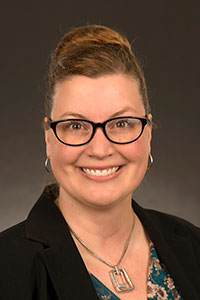
Victoria (Tori) Scharp, Ph.D., CCC-SLP
Program Director, PhD in Rehabilitation & Health Sciences
Assistant Professor
Office: SPA Building 68, Room 314B
Research Areas:
- Nature and treatment of adult neurogenic disorders (e.g aphasia, right hemisphere damage
- Intensive service delivery models for rehabilitation
Education
- Doctor of Philosophy (Ph.D.) in Communication Sciences and Disorders, 2016, University of Pittsburgh, Pittsburgh, PA
- Master of Arts (M.A.) in Speech-Language Pathology, 2002, Miami University, Oxford, OH
- Bachelor of Science (B.S.) in Speech-Language Pathology and Audiology, 2000, Miami University, Oxford, OH
Biography:
Victoria (Tori) Scharp, PhD CCC-SLP is an Associate Professor in the Department of Communication Sciences and Disorders. Dr. Scharp completed her Ph.D. at the University of Pittsburgh and has worked clinically for over 15 years in a wide variety of settings. Dr. Scharp is part of an integral international working group that studies the scope and implementation practices of intensive aphasia programs and she is a guest editor for an upcoming special issue in Aphasiology commemorating 10 years of Intensive Comprehensive Aphasia Programs as a service delivery model. Dr. Scharp also supports a research team in the College of Health that studies patient engagement measurement scales in community-engaged health research.
Lab Description:
Dr. Scharp directs the Scharp Language and Brain Lab housed on the Pocatello campus and is the co-founder of the Mountain West Aphasia Research Collective with Dr. Catherine Off at the University of Montana. Dr. Scharp's clinical line of research centers on patient outcomes including discourse-level variables, student training competencies, and family care partner perspectives associated with intensive aphasia rehabilitation programs of varying durations.
Current projects and initiatives:
- Sustainability factors including facilitators and barriers to Intensive Comprehensive Aphasia Programs (ICAP)
- Classifying gaps in the ICAPs evidence base
- Discourse outcomes following participation in ICAPs and modified-ICAPs
- Humor instances in ICAP group therapy
- Systematic review of quantitative engagement measurement scales in community-engaged health research
Hobbies: hiking, playing tennis, reading, snowshoeing, and traveling
